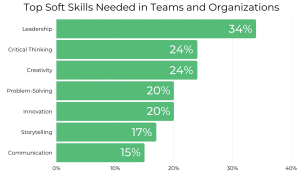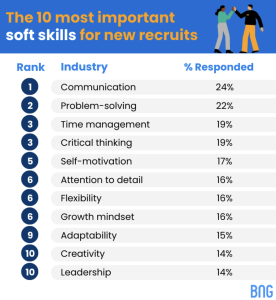You will often hear HR commentators say that the only predictable thing in business today is unpredictability.
It’s certainly the case that as today’s world continues to move faster; becoming ever-more complex, it often feels like no two days are the same. Globalization, technological advances, and increased access to information are all contributing to this current rapid-fire state of change, presenting both challenges and opportunities for organizations.
But the irony is, that as leaders struggle to keep up in this new environment, it’s more likely that it’s so-called ‘softer skills’ that are needed, not necessarily ‘hard’ ones.

Source: https://emeritus.org/blog/soft-skills-in-the-workplace/
In fact, what we’re increasingly learning is that the best organizations in this disruptive and disrupted world have three key characteristics: an adaptable culture, change friendly systems and structures, and employees that have ‘change skills’ and capabilities.
The role HR needs to play
Given it’s HR leaders that play a pivotal role in fostering change capability within the workforce, it’s HR that needs to fundamentally rethink what it takes to thrive today.
In this dynamic landscape, traditional models and static structures often become impediments to progress.
So what of these so-called ‘soft-skills’?
Historically, “soft” skills, such as adaptability, were seen as desirable but not essential.
Today I would argue they are foundational and a key differentiator that will allow organizations to better respond to disruption.
Developing a change-ready workforce begins with identifying the essential change skills and capabilities needed for the organization’s future success.
Leaders need to acknowledge the fact that the workforce will not develop the necessary skills by happenstance; skills need to be intentionally fostered and reinforced over time.
So, the first step is to identify the critical change skills and capabilities that are needed to enable the organization for the future.
These skills, often transcending specific industries and roles, should include:
- Agility and adaptability: The ability to respond, quickly, to the changing needs of the environment and shifting market (or internal) demands.
- Proactive problem-solving: The habit of looking at both the risks and opportunities that are emerging, with an eye toward mitigating emerging risks and capitalizing on emerging opportunities.
- Principles-based decision-making: Recognizing the limits of rigid strategic roadmaps or workplans and embracing the notion of a core set of principles to guide real-time decision-making and necessary pivots.
Once the critical change skills are identified (and likely also including skills beyond those above), creating a multifaceted strategy is essential to embed them across the workforce.
I believe this multi-fold strategy should include three core elements:
1) Formal learning
Change skills and capabilities are not typically taught in school or in many traditional employee development programs. HR leaders need to invest in structured learning opportunities that provide a framework for change, in-classroom discussions to contextualize and practice those skills, and opportunities for meaningful self-reflection. This formal learning should then provide a common language and context for employees to practice these new skills when they’re on the job and at their desks.
2) On-the-job application
Learning cannot stop in the “classroom.” For skills to take hold and mature over time, employees need to have the chance to practice new skills in the context of their jobs. This can occur through projects they are already working on in their day jobs (e.g. consider how they may apply scenario planning to a critical strategic initiative underway, so they are more prepared for real-time pivots), or through newly formed, cross-functional teams tasked with tackling a particular challenge that will require new ways of working (i.e. not just working harder), to solve.
The key for this on-the-job learning to be most effective is to ensure managers and other leaders embrace experimentation and a “fail fast” mentality – recognizing that folks are likely to stumble when first implementing new skills.
Throughout this process, leaders need to acknowledge and celebrate when these new skills are demonstrated and highlight how they contributed to meaningful results.
3) Hiring and recruiting
In addition to investing in the current workforce, HR leaders also need to reimagine hiring and recruiting practices to ensure that new talent is both sourced and evaluated through the lens of these “skills of the future.”
If criteria for vetting new talent is aligned with old ways of working, leaders will inevitably have to retrain (or even move out), newly hired talent. A first step could include avoiding focusing the majority of a hiring interview on things like technical skills.
Or, recruiter might need to ensure interviews are asking candidates to articulate examples of how they have navigated ambiguity or pivoted their approach to a particular project part way through, and the results that doing so enabled.
It is imperative to embed change skills and capabilities into recruiting, interviewing, and onboarding processes to more quickly scale a workforce that is ready to navigate today – and tomorrow’s – environment and reality.
The future of work demands change readiness
The constant pace of change demands a workforce equipped to adapt and navigate challenging new situations.
By focusing on identifying and cultivating critical change skills, HR leaders can build an organization well-positioned not only to navigate today’s challenges but also to embrace the future.
“Soft skills” are no longer optional; they are the cornerstone of individual and organizational adaptability in today’s rapidly evolving landscape.
What the data says:

New data from Resume Genius [2024 Hiring Trends Survey] reveals:
- Analytical thinking and customer service skills are the most in-demand skills on a resume in 2024, with 35% of looking for candidates with these skills
- 65% would look at candidates with relevant skills over those with an extensive employment history or academic credentials.
- 47% consider educational qualifications important, with 25% seeing these attributes as absolutely essential.
- 54% believe soft skills are highly important.
- 48% have opted not to hire a candidate because of a lack of soft skills.
- 43% don’t require a degree from a prestigious institution.
- 66% of hiring managers believe soft skills can be taught.
